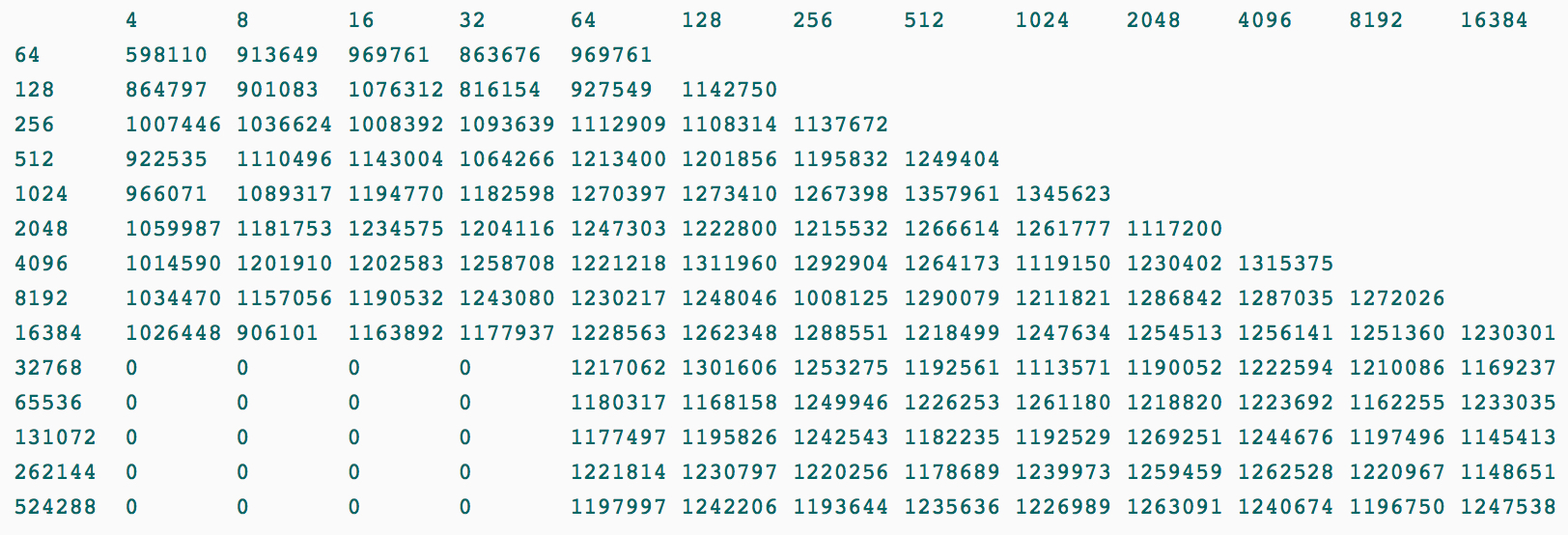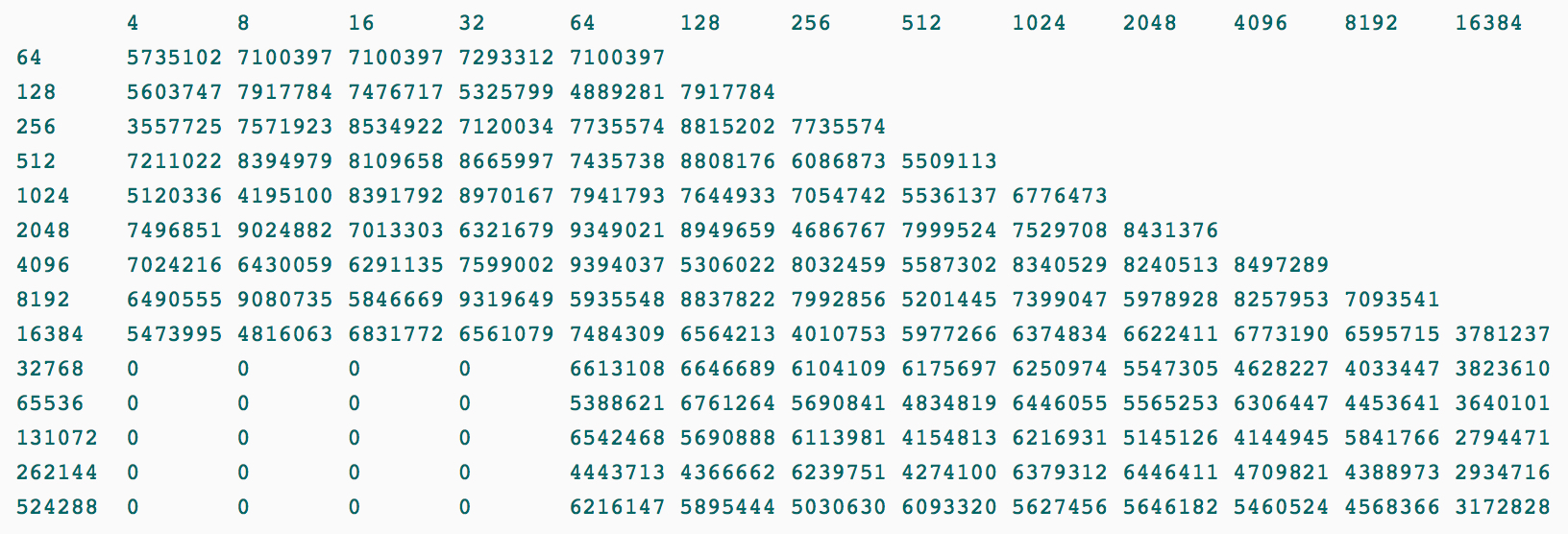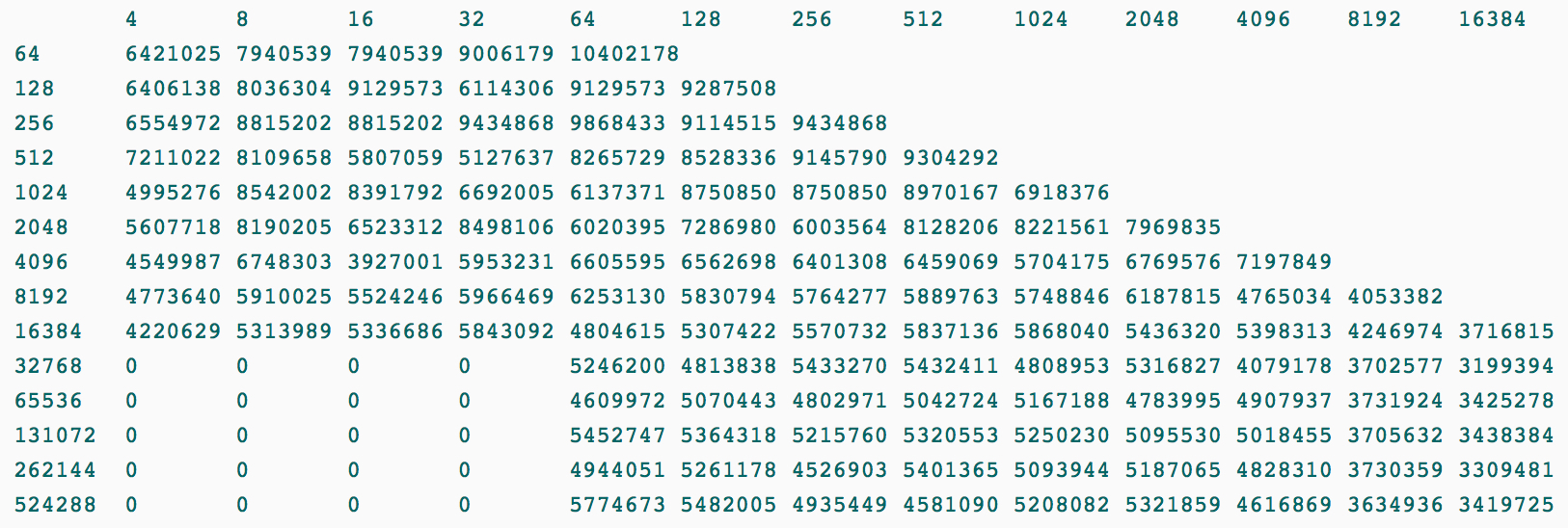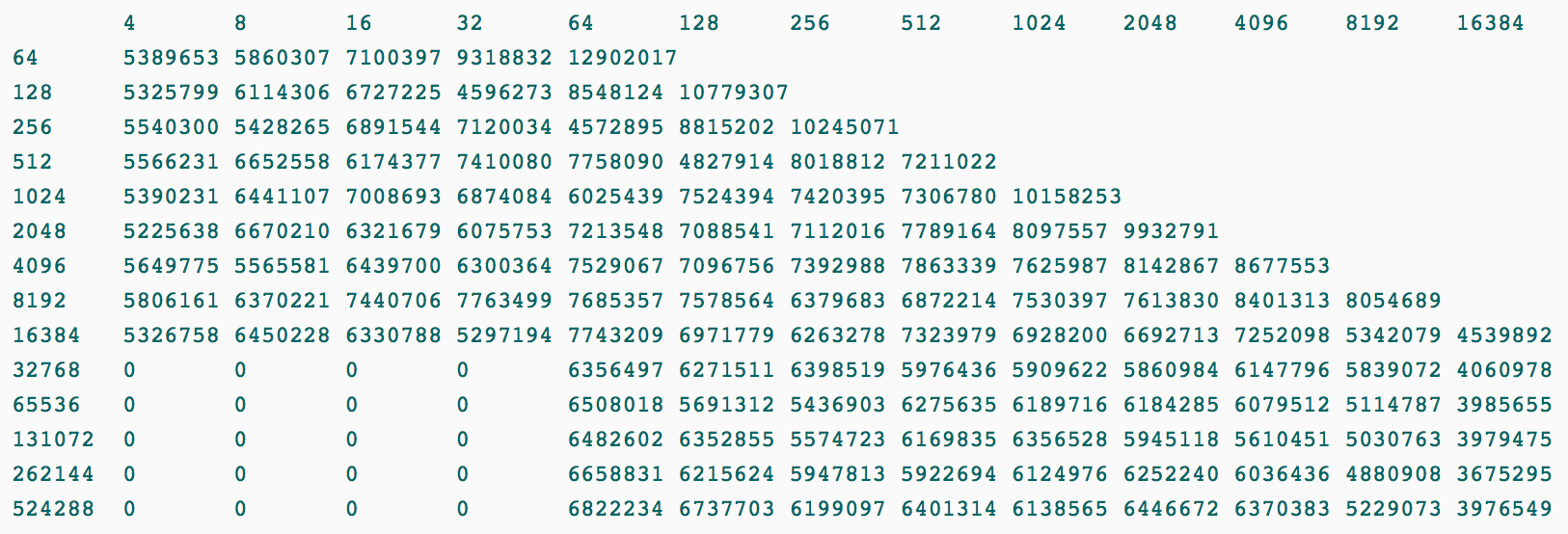Enterprise SSD caching is running in InfoboxCloud. Benchmarks with Amazon EC2 and Windows Azure
We are pleased to announce the addition of Enterprise SSD caching in Moscow and Amsterdam InfoboxCloud locations for all users. The use of SSD-caching technology has made it possible to achieve a high speed of randomly writing data, which is especially important for users working with loaded databases.
Amsterdam uses DataCenter SSDs that are optimized for high load tasks and have a built-in battery for additional data protection. Moscow uses PCI – Express SSD drives, which have significantly higher performance than conventional SSDs.

')
In this article we will see the real performance tests of the disk subsystem InfoboxCloud in comparison with Amazon M3.xlarge and Azure D3. In the end, we calculate how much it all costs.
SSDs in InfoboxCloud are used as a volume write and read cache, counting checksums of data and periodic monitoring of cluster health (periodic cluster data reads are performed to ensure that the process is correct and cluster hosts are available), as well as to host file system logs. Failure of one or another SSD disk or host does not lead to data loss. All data is automatically and reliably replicated on-the-fly in a distributed, fault-tolerant Cloud Storage file system. The load on the disk subsystem is distributed evenly among the hosts.
Throughout the cluster, we use SSD drives not below the level of the Data Center. Some cloud providers install low-cost, slower SSDs, and use the term SSD mainly for marketing purposes. The difference between the usual Desktop – class SSD and Enterprise SSD in speed, simultaneous recording and reading of a large number of clients, the built-in battery, which makes it possible not to lose data in the process of recording when the server is turned off.
We chose a combination of Enterprise SSD caches and SAS15K arrays in the distributed storage storage system Cloud Storage, in order to provide not only the ability to work quickly with data, but also the relatively low cost of data storage. Previously, users had to choose: either use inexpensive storage or fast. We tried to combine both advantages in one cloud.
In this section, we tried to test the InfoboxCloud disk subsystem in comparison with competitors offering clouds on SSD. We just took the popular tests and ran them on different virtual machines. The results are presented as is and, of course, they may differ. Nevertheless, they allow us to present an overall picture of the performance of the disk subsystem of various cloud providers. The test result below is intended to answer the question: can a high-speed SSD cache be comparable in speed using arrays of SSD disks? With a much more affordable price, the cache allows the user to work with significant amounts of data without worrying about the project budget.
For tests, Amazon and Windows Azure are considered as competitors as representatives of the enterprise – sector cloud.
Among all the clouds tested, only InfoboxCloud allows you to set the values of CPU, RAM and disk independently of each other, which allows the user to get the amount of resources that are really needed and add the required resource if necessary without being tied to other resources. For testing in InfoboxCloud, values identical to Azure D3 were set.
The tests are quite voluminous. If they are of no interest to you - go directly to the section "Price Comparison".

Link to the original screenshot .

Link to the original screenshot.
The first test used a C Azure drive, which, as it turned out, is not an SSD. The subsequent tests used disk D. In the original screenshot, the document that lies at the root of disk D and reports that using SSD in Azure is at your own peril and risk.

Link to the original screenshot .

Link to the original screenshot.

Link to the original screenshot.

Link to the original screenshot.

Link to the original screenshot.

Link to the original screenshot

Result: 3063.43 IOPS
Link to the original screenshot.

Result: 4857.26 IOPS
Link to the original screenshot.

Result: 17956.81 IOPS
Link to the original screenshot.

Result: 15224.63 IOPS
Link to the original screenshot.
This section presents only some of the results of this comprehensive test. The remaining results are close and there are no special revelations. Full test results are available at the links:
Amazon M3 SSD IOzone
Windows Azure D3 SSD IOzone
InfoboxCloud Moscow PCI – Express SSD cache
InfoboxCloud Amsterdam SSD DataCenter Level Cache

The top column is the record size, the left column is the file size. The table shows the speed of entries for the given parameters.
0 - the measurement was not performed.


The top column is the record size, the left column is the file size. The table shows the speed of entries for the given parameters.
0 - the measurement was not performed.


The top column is the record size, the left column is the file size. The table shows the speed of entries for the given parameters.
0 - the measurement was not performed.


The top column is the record size, the left column is the file size. The table shows the speed of entries for the given parameters.
0 - the measurement was not performed.


The top column is the record size, the left column is the file size. The table shows the speed of entries for the given parameters.
0 - the measurement was not performed.


The top column is the record size, the left column is the file size. The table shows the speed of entries for the given parameters.
0 - the measurement was not performed.


The top column is the record size, the left column is the file size. The table shows the speed of entries for the given parameters.
0 - the measurement was not performed.


The top column is the record size, the left column is the file size. The table shows the speed of entries for the given parameters.
0 - the measurement was not performed.

Let's calculate how much the machines used in the test cost to the user. For all machines, we assume that we use 5000 gigabytes of outgoing traffic per month.
For the calculation of prices taken the region "Ireland".
The cloud server includes 4 processor cores of unknown frequency, 13 gigabytes of RAM, 2 disks of 40 gigabytes each, and costs $ 0.308 per hour + outgoing traffic cost $ 0.090 per gigabyte (the first gigabyte as a gift).
Server cost per month = 0.308 * 24 * 31 * 52.69 (the dollar exchange rate on 12/05/2014) = 1,2,074 rubles.
The cost of 5 gigabytes of traffic = (5000 * 0.090-0.090) * 52.69 = 23705 rubles.
The total cost of using the server and traffic per month = 35779 rubles.
In doing so, basic technical support advises only on billing and subscription management. Everything else is for some money.
It is necessary to take into account that the compared instances differ by 2GB in memory due to the fact that Azure does not have a ready instance similar to Azure D3 in terms of resources and it is impossible to set the required amount of resources independently of other resources in InfoboxCloud. However, this difference did not play any noticeable role in the test.
The cloud server includes 4 processor cores of unknown frequency, 14 gigabytes of RAM and 200 gigabytes of disk space. The cost of the server itself: 23.71 rubles per hour if we use Windows and 13.03 rubles per hour if we use Linux. These prices will take effect from January 1, 2015, before that more expensive. The cost of outgoing traffic 3,0146 rubles per gigabyte (the first 5 gigabytes for free).
Server cost with Windows per month = 23.71 * 24 * 31 = 17640 rubles.
Server cost with Linux per month = 13.03 * 24 * 31 = 9694 rubles.
The cost of 5000 gigabytes of traffic = 5000 * 3.0146 - 5 * 3.0146 = 15073 - 15 = 15058 rubles.
Server cost with Windows and traffic per month = 17640 + 15058 = 32698 rubles.
Server cost with Linux and traffic per month = 9694 + 15058 = 24752 rubles.
In doing so, basic technical support advises only on billing and subscription management. Everything else is for some money.
We set the value for the test: 4 processor cores at 2.3 gigahertz, 14 gigabytes of RAM and 200 gigabytes of disk space. The cost of resources is indicated on our page . In fact, you don’t need to count manually; in the control panel of the cloud, with the selected settings, the approximate cost of the server per month is shown. The cost of external outgoing traffic is 0.5 rubles / gigabyte, with the first 3 terabytes free of charge.
Server cost per month: 8154.00 rubles.
The cost of traffic per month: 0.5 * 2000 = 1000 rubles.
The cost of the server with traffic is 9154 rubles per month.
According to the test results, we found that the performance of the InfoboxCloud disk subsystem using Enterprise SSD caching is quite comparable with pure SSD servers from Amazon and Azure (and in some cases exceeds them). At the same time, the price of the cloud server in InfoboxCloud is much less than its competitors. In addition, InfoboxCloud provides continuous replication of cloud server data, and Azure warns that using SSD is not safe and is not recommended for permanent data storage.
We tried to do extensive tests for you and every day we make the cloud better. Join now! Email us and get a trial version of InfoboxCloud for free for 15 days (a first name, last name and email are enough to register).
If you find an error in the article, the author will gladly correct it. Please write in the LAN or in the mail about it. If you can not write comments on the site, you can leave them in the InfoboxCloud Community .
Quick work of your projects!
Amsterdam uses DataCenter SSDs that are optimized for high load tasks and have a built-in battery for additional data protection. Moscow uses PCI – Express SSD drives, which have significantly higher performance than conventional SSDs.

')
In this article we will see the real performance tests of the disk subsystem InfoboxCloud in comparison with Amazon M3.xlarge and Azure D3. In the end, we calculate how much it all costs.
What is Enterprise SSD caching for?
SSDs in InfoboxCloud are used as a volume write and read cache, counting checksums of data and periodic monitoring of cluster health (periodic cluster data reads are performed to ensure that the process is correct and cluster hosts are available), as well as to host file system logs. Failure of one or another SSD disk or host does not lead to data loss. All data is automatically and reliably replicated on-the-fly in a distributed, fault-tolerant Cloud Storage file system. The load on the disk subsystem is distributed evenly among the hosts.
Throughout the cluster, we use SSD drives not below the level of the Data Center. Some cloud providers install low-cost, slower SSDs, and use the term SSD mainly for marketing purposes. The difference between the usual Desktop – class SSD and Enterprise SSD in speed, simultaneous recording and reading of a large number of clients, the built-in battery, which makes it possible not to lose data in the process of recording when the server is turned off.
We chose a combination of Enterprise SSD caches and SAS15K arrays in the distributed storage storage system Cloud Storage, in order to provide not only the ability to work quickly with data, but also the relatively low cost of data storage. Previously, users had to choose: either use inexpensive storage or fast. We tried to combine both advantages in one cloud.
Real-world performance tests
In this section, we tried to test the InfoboxCloud disk subsystem in comparison with competitors offering clouds on SSD. We just took the popular tests and ran them on different virtual machines. The results are presented as is and, of course, they may differ. Nevertheless, they allow us to present an overall picture of the performance of the disk subsystem of various cloud providers. The test result below is intended to answer the question: can a high-speed SSD cache be comparable in speed using arrays of SSD disks? With a much more affordable price, the cache allows the user to work with significant amounts of data without worrying about the project budget.
For tests, Amazon and Windows Azure are considered as competitors as representatives of the enterprise – sector cloud.
Among all the clouds tested, only InfoboxCloud allows you to set the values of CPU, RAM and disk independently of each other, which allows the user to get the amount of resources that are really needed and add the required resource if necessary without being tied to other resources. For testing in InfoboxCloud, values identical to Azure D3 were set.
The tests are quite voluminous. If they are of no interest to you - go directly to the section "Price Comparison".
Atto Disk Benchmark (default settings). More value in the test is better
Amazon M3 SSD (Atto)

Link to the original screenshot .
Windows Azure D3 SSD (Atto)

Link to the original screenshot.
The first test used a C Azure drive, which, as it turned out, is not an SSD. The subsequent tests used disk D. In the original screenshot, the document that lies at the root of disk D and reports that using SSD in Azure is at your own peril and risk.
InfoboxCloud Moscow PCI – Express SSD Cache (Atto)

Link to the original screenshot .
InfoboxCloud Amsterdam SSD DataCenter Level Cache (Atto)

Link to the original screenshot.
CrystalDiskMark (selected maximum test with a file of 4 GB). More value in the test is better
Amazon M3 SSD (CrystalDiskMark)

Link to the original screenshot.
Windows Azure D3 SSD (Disk D) (CrystalDiskMark)

Link to the original screenshot.
InfoboxCloud Moscow PCI – Express SSD cache (CrystalDiskMark)

Link to the original screenshot.
InfoboxCloud Amsterdam SSD DataCenter Level Cache (CrystalDiskMark)

Link to the original screenshot
SQLIO. More value in the test is better
Amazon M3 SSD (SQLIO)

Result: 3063.43 IOPS
Link to the original screenshot.
Windows Azure D3 (disk D) (SQLIO)

Result: 4857.26 IOPS
Link to the original screenshot.
InfoboxCloud Moscow PCI – Express SSD Cache (SQLIO)

Result: 17956.81 IOPS
Link to the original screenshot.
InfoboxCloud Amsterdam DataCenter Level SSD Cache (SQLIO)

Result: 15224.63 IOPS
Link to the original screenshot.
Iozone
This section presents only some of the results of this comprehensive test. The remaining results are close and there are no special revelations. Full test results are available at the links:
Amazon M3 SSD IOzone
Windows Azure D3 SSD IOzone
InfoboxCloud Moscow PCI – Express SSD cache
InfoboxCloud Amsterdam SSD DataCenter Level Cache
IOzone write test (Linux)
Amazon M3 SSD (IOzone write test)

The top column is the record size, the left column is the file size. The table shows the speed of entries for the given parameters.
0 - the measurement was not performed.

Windows Azure D3 SSD (/ mnt) (IOzone write test)

The top column is the record size, the left column is the file size. The table shows the speed of entries for the given parameters.
0 - the measurement was not performed.

InfoboxCloud Moscow PCI – Express SSD Cache (IOzone write test)

The top column is the record size, the left column is the file size. The table shows the speed of entries for the given parameters.
0 - the measurement was not performed.

InfoboxCloud Amsterdam SSD DataCenter Level Cache (IOzone Record Test)

The top column is the record size, the left column is the file size. The table shows the speed of entries for the given parameters.
0 - the measurement was not performed.

IOzone reading test (Linux)
Amazon M3 SSD (IOzone reading test)

The top column is the record size, the left column is the file size. The table shows the speed of entries for the given parameters.
0 - the measurement was not performed.

Windows Azure D3 SSD (disk D) (IOzone reading test)

The top column is the record size, the left column is the file size. The table shows the speed of entries for the given parameters.
0 - the measurement was not performed.

InfoboxCloud Moscow PCI – Express SSD Cache (IOzone reading test)

The top column is the record size, the left column is the file size. The table shows the speed of entries for the given parameters.
0 - the measurement was not performed.

InfoboxCloud Amsterdam SSD cache of the DataCenter level (IOzone reading test)

The top column is the record size, the left column is the file size. The table shows the speed of entries for the given parameters.
0 - the measurement was not performed.

Price comparison
Let's calculate how much the machines used in the test cost to the user. For all machines, we assume that we use 5000 gigabytes of outgoing traffic per month.
Amazon m3.xlarge
For the calculation of prices taken the region "Ireland".
The cloud server includes 4 processor cores of unknown frequency, 13 gigabytes of RAM, 2 disks of 40 gigabytes each, and costs $ 0.308 per hour + outgoing traffic cost $ 0.090 per gigabyte (the first gigabyte as a gift).
Server cost per month = 0.308 * 24 * 31 * 52.69 (the dollar exchange rate on 12/05/2014) = 1,2,074 rubles.
The cost of 5 gigabytes of traffic = (5000 * 0.090-0.090) * 52.69 = 23705 rubles.
The total cost of using the server and traffic per month = 35779 rubles.
In doing so, basic technical support advises only on billing and subscription management. Everything else is for some money.
It is necessary to take into account that the compared instances differ by 2GB in memory due to the fact that Azure does not have a ready instance similar to Azure D3 in terms of resources and it is impossible to set the required amount of resources independently of other resources in InfoboxCloud. However, this difference did not play any noticeable role in the test.
Windows Azure D3
The cloud server includes 4 processor cores of unknown frequency, 14 gigabytes of RAM and 200 gigabytes of disk space. The cost of the server itself: 23.71 rubles per hour if we use Windows and 13.03 rubles per hour if we use Linux. These prices will take effect from January 1, 2015, before that more expensive. The cost of outgoing traffic 3,0146 rubles per gigabyte (the first 5 gigabytes for free).
Server cost with Windows per month = 23.71 * 24 * 31 = 17640 rubles.
Server cost with Linux per month = 13.03 * 24 * 31 = 9694 rubles.
The cost of 5000 gigabytes of traffic = 5000 * 3.0146 - 5 * 3.0146 = 15073 - 15 = 15058 rubles.
Server cost with Windows and traffic per month = 17640 + 15058 = 32698 rubles.
Server cost with Linux and traffic per month = 9694 + 15058 = 24752 rubles.
In doing so, basic technical support advises only on billing and subscription management. Everything else is for some money.
InfoboxCloud
We set the value for the test: 4 processor cores at 2.3 gigahertz, 14 gigabytes of RAM and 200 gigabytes of disk space. The cost of resources is indicated on our page . In fact, you don’t need to count manually; in the control panel of the cloud, with the selected settings, the approximate cost of the server per month is shown. The cost of external outgoing traffic is 0.5 rubles / gigabyte, with the first 3 terabytes free of charge.
Server cost per month: 8154.00 rubles.
The cost of traffic per month: 0.5 * 2000 = 1000 rubles.
The cost of the server with traffic is 9154 rubles per month.
Conclusion Trial version for free!
According to the test results, we found that the performance of the InfoboxCloud disk subsystem using Enterprise SSD caching is quite comparable with pure SSD servers from Amazon and Azure (and in some cases exceeds them). At the same time, the price of the cloud server in InfoboxCloud is much less than its competitors. In addition, InfoboxCloud provides continuous replication of cloud server data, and Azure warns that using SSD is not safe and is not recommended for permanent data storage.
We tried to do extensive tests for you and every day we make the cloud better. Join now! Email us and get a trial version of InfoboxCloud for free for 15 days (a first name, last name and email are enough to register).
If you find an error in the article, the author will gladly correct it. Please write in the LAN or in the mail about it. If you can not write comments on the site, you can leave them in the InfoboxCloud Community .
Quick work of your projects!
Source: https://habr.com/ru/post/245567/
All Articles